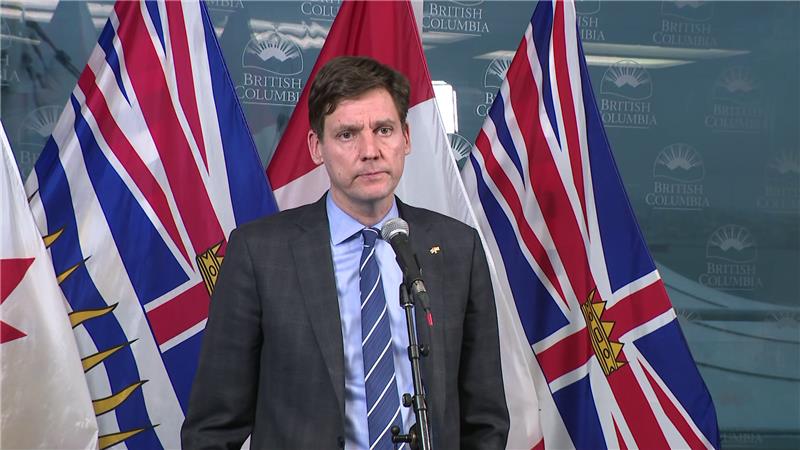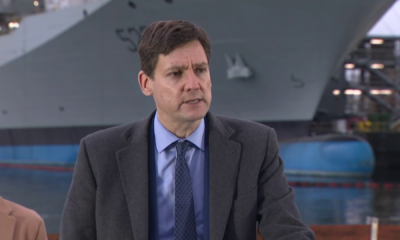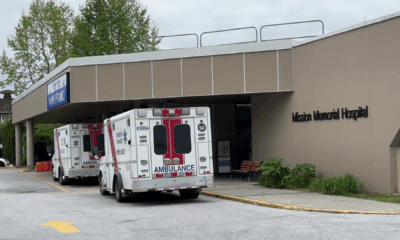Local News
B.C. premier says province’s retaliation on pause with tariff delay

B.C. Premier David Eby publicly addressed the threats of U.S. tariffs on Canadian goods for a second time in one day Monday afternoon.
Since Eby’s Monday morning appearance, Prime Minister Justin Trudeau announced that after a call with U.S. President Donald Trump, the tariffs, which were set to go into effect Tuesday, will now be paused for at least 30 days while the two sides work towards a permanent deal.
Speaking in Vancouver Monday afternoon, Eby says the pause negotiated by the two nations’ leaders is a welcome reprieve, but B.C. will not abandon its preparations to strengthen the provincial economy in a number of ways that are not retaliatory tariffs.
Eby says the “profoundly awful and uncomfortable experience” hasn’t changed British Columbians’ relationships with individual Americans, but has changed business relationships with the U.S. “for the foreseeable future.”
He says the pause provides some room to prepare but doesn’t believe that Trump is dealing in good faith.
“We understand now, very clearly, the president’s intention, which is to make Canada the 51st state. And we know that our best defence against that is a strong economy where we can stand on our own two feet here in Canada and British Columbia, not dependent on a single person in the White House and the whims that may come,” said Eby.
He says he wants to take Trump at his word, but he’s skeptical that anything will change within the next month.
B.C. will participate fully with the federal government in its response to Trump’s requests, Eby says, adding that the province has already made “meaningful” change enforcing border security and port security.
“But let’s not lose track of the fact that this was never about fentanyl.”
The events since the time that the tariffs were first threatened, Eby says, have already changed how British Columbians do business with Americans.
“Some of this is positive for B.C. companies to be looking at customers overseas, to be finding those customers, and to be trading with them, even though there’s some short-term pain and inconvenience and logistical problems to solve,” said Eby.
“Some of it is bad news: an already threatened forest industry hurt by soft lumber tariffs and low prices and forest fires and pine beetles. The reality of the impacts and the decisions by forest companies in this moment is that they don’t really know whether to put money in or how to invest, or whether they should invest and where they should invest. And so our goal for industries like forestry, mining, energy, and others, as well as manufacturing, will be to support them, to find those overseas markets, to ensure that stability.”
Eby says his government has already identified a list of projects amounting to 6,000 jobs in B.C. with “particular attention to more rural and remote communities that are more likely to be affected by the tariff impacts.”
He says the list, which will be released Tuesday, is designed to getting people employed and diversifying the economy.
“Assuming that we’re going to see four years of continual on-and-off tariff threats from the president, we need to be a stable environment for British Columbians and Canadians, and we’re going to do that.”
Meanwhile, the province is expected to deliver an annual budget on March 4. Eby says the tariff threats “make it very difficult to plan.”
“It’s very possible that we could release a budget that is based on a set of assumptions that, few days later, are out of date. That is the environment that we’re in right now,” said Eby.
In January, the premier outlined B.C.’s plan to respond to the threats, including through retaliatory tariffs, targeted tariffs, and specific embargos.
No matter what happens in the next 30 days, Eby says the province will work to overhaul its trade portfolio and become less dependent on American goods.
“The ball has been set in motion by the president here. We take it seriously. We take his threat seriously. We believe that it’s just as likely that 30 days from now, the tariffs will be gone as they will be back in place. And so we got to prepare for the worst case scenario, even though we hope for the best.”












